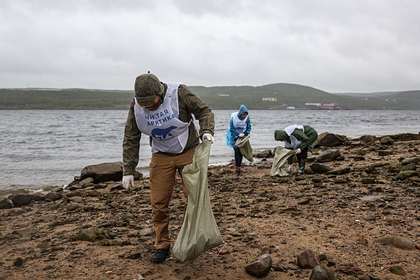More than 2 thousand volunteers collected over 1,500 tons of waste in the Arctic 
“On the implementation of the public federal project” Clean Arctic “. The final figures were announced by the Minister of the Russian Federation for the Development of the Far East and the Arctic Alexei Chekunkov.
In just a few months, over 2,000 volunteers have collected over 1,500 tons of waste in all Arctic regions of the country. The work took place in Taimyr and in the capital of the Yakut Arctic – Tiksi, on the Yamal island of Vilkitsky and the Novaya Zemlya archipelago. The territory was cleared in Komi – on the border of the Arctic Circle and at the White Sea petroglyphs in Karelia, at the ancient Novodvinsk fortress in the Arkhangelsk region and on Teriberka, near the Barents Sea.
“In 2021, within the framework of the Clean Arctic project, more than 1,500 tons of waste were collected in the Arctic regions of Russia: barrels of fuel, tires, plastic and wood. The figure of 1.5 million kilograms is impressive. It is comparable to the weight of a train of nearly two dozen fully loaded open wagons. Approximately this amount of waste is produced monthly by the population of a small Russian city with a population of about 45 thousand people. More than 2,200 volunteers have taken part in the project since July. More than 3,000 people applied for participation – all of them entered the volunteer reserve for the next year, “said Alexei Chekunkov.
The Minister of the Russian Federation for the Development of the Far East and the Arctic emphasized that the project is acquiring new meanings and directions … According to him, “Clean Arctic” has become a platform for uniting and implementing important initiatives and programs.
“In one season, the Clean Arctic project began to carry not only an environmental, but also a humanitarian mission to develop the Arctic and strengthen Russia's status as a leading Arctic power. Starting from 2022, in addition to carrying out work to eliminate the accumulated harm, in all nine Arctic regions of the Russian Federation, it is planned to implement programs to support children and talented youth in the Arctic, social support for indigenous peoples, and create infrastructure, including cultural centers and Arctic museums. Solutions are needed to ensure the recycling or reuse of containers and materials used in the supply of life support goods to the Arctic as part of the northern delivery. In addition, it is necessary to solve the problem so that there is not only import, but also export from the Arctic territories, “the minister concluded.
Deputy Chairman of the Federation Council Galina Karelova promised to monitor legislation by the end of January, as during The project participants faced legal difficulties. Deputy Minister of Natural Resources and Environment of the Russian Federation Sergey Anoprienko also spoke about the need to update the legislative framework. He recalled that it was the Ministry of Natural Resources and Environment that appealed to the heads of all subjects of the Arctic zone with a request to take personal control of its implementation, as well as to work together with the organizing committee with enterprises operating in the Arctic. According to Andrey Nagibin, head of the Clean Arctic project office, business needs to be more actively involved in the project.